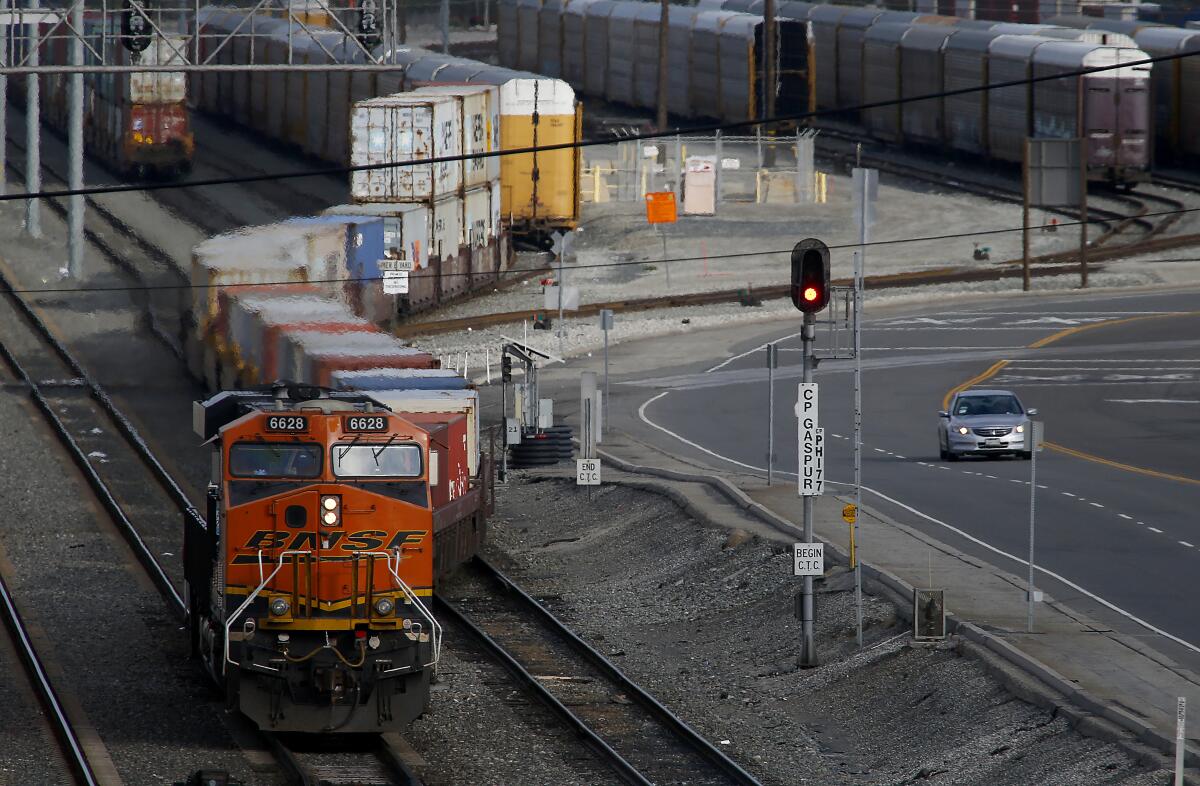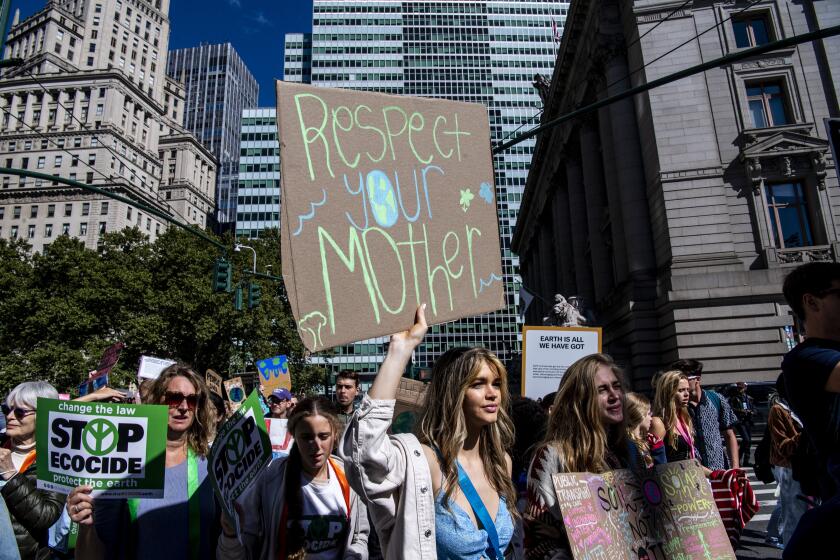If L.A. air quality officials go soft on toxic railroad pollution, are the ports next?

- Share via
In 2018, Southern California air quality officials made the hard-fought decision to finally crack down on freight industry pollution and began developing rules to force warehouses and railyards to reduce health-damaging emissions from trains, trucks and other vehicles and equipment that are concentrated at cargo hubs.
But now the South Coast Air Quality Management District has signaled it may back down on adopting some of those rules. Officials announced recently that they are considering cutting a deal with BNSF Railway and Union Pacific to abandon mandatory regulations in favor of a voluntary agreement in which the companies would promise to reduce their emissions.
California’s climate lawsuit against big oil companies isn’t only notable for its pursuit of industry accountability for the damage being caused by fossil fuels. Just as important is its potential to end decades of industry deception about climate change.
The agency’s pivot from rule-making to deal-making is troubling, and it raises questions about the commitment to another big piece of unfinished business: similar rules for the ports of Los Angeles and Long Beach. The sprawling complex is the single biggest pollution source in the nation’s smoggiest region, but the publicly owned ports have for years successfully fought off regulators’ attempts to force them to cut emissions. The air district wasted years trying to negotiate a voluntary agreement with the ports, only to decide last year that imposing rules was the best option after all.
There’s reason to be concerned about backsliding. Air quality officials say the rules they are now developing will not be completed by the end of this year as planned, and that the ports have launched an aggressive campaign to stop them, with support from organized labor. Port officials said they haven’t made new requests for a voluntary deal.
After the feds rejected a petition to kick them off the endangered species list, these iconic marine mammals need assistance to reclaim more of their historical range.
Whether the air district regulates ports and railyards is ultimately up to its 13-member governing board, made up of elected and appointed officials who have shown reluctance to regulate pollution from the goods-movement industry that is vital to the Southern California economy. It’s not clear whether Los Angeles Mayor Karen Bass and Long Beach Mayor Rex Richardson, who control the ports and appoint their leaders, favor a rule-based approach. A spokesperson for Bass said she would keep working with the ports and AQMD “in developing robust sustainability commitments.”
Slow progress in curbing the hazardous diesel pollution that spews from semi trucks, container ships, cargo-handling equipment and locomotives is a big reason why Southern Californians still breathe the nation’s dirtiest air, and why so many suffer higher rates of asthma, cancer and early death from heart and lung disease.
The air district has floated a few concepts for what might be in an agreement with the railroads. But the details remain nebulous, and negotiations are happening behind closed doors.
While thousands prepare to march in New York City with a clear demand to protect the environment for future generations, some of those in power are talking about ending only “unabated” emissions.
Air quality officials argue that working with the railroads, rather than imposing rules that the industry is likely to challenge in court, could bring faster air quality improvements, without the threat that rules could be thrown out.
But industry commitments are no sure bet either. California regulators have a 25-year history of signing voluntary agreements with the railroads with little improvement to show for it. And the ports have treated their pollution-reduction pledges more like aspirations than hard-and-fast commitments.
Community groups from Wilmington to Colton have good reason to be distrustful of the railroads and the ports, where insufficient progress in reducing emissions is doing ongoing health damage to nearby residents.
To understand the value of regulation over voluntary commitments, consider the groundbreaking rules imposed on warehouse distribution centers two years ago. Pollution has already been reduced, millions of dollars in fees have been raised for smog-cutting projects and regulators have launched a major enforcement crackdown.
An agency whose entire mission is to protect the public from air pollution should not allow itself to be bullied into abandoning rules to force polluters to clean up. If dry cleaners, gas stations, auto body shops and other small businesses can be held to emissions rules, so can the multibillion-dollar railroad companies and the massive ports they serve.
More to Read
A cure for the common opinion
Get thought-provoking perspectives with our weekly newsletter.
You may occasionally receive promotional content from the Los Angeles Times.












